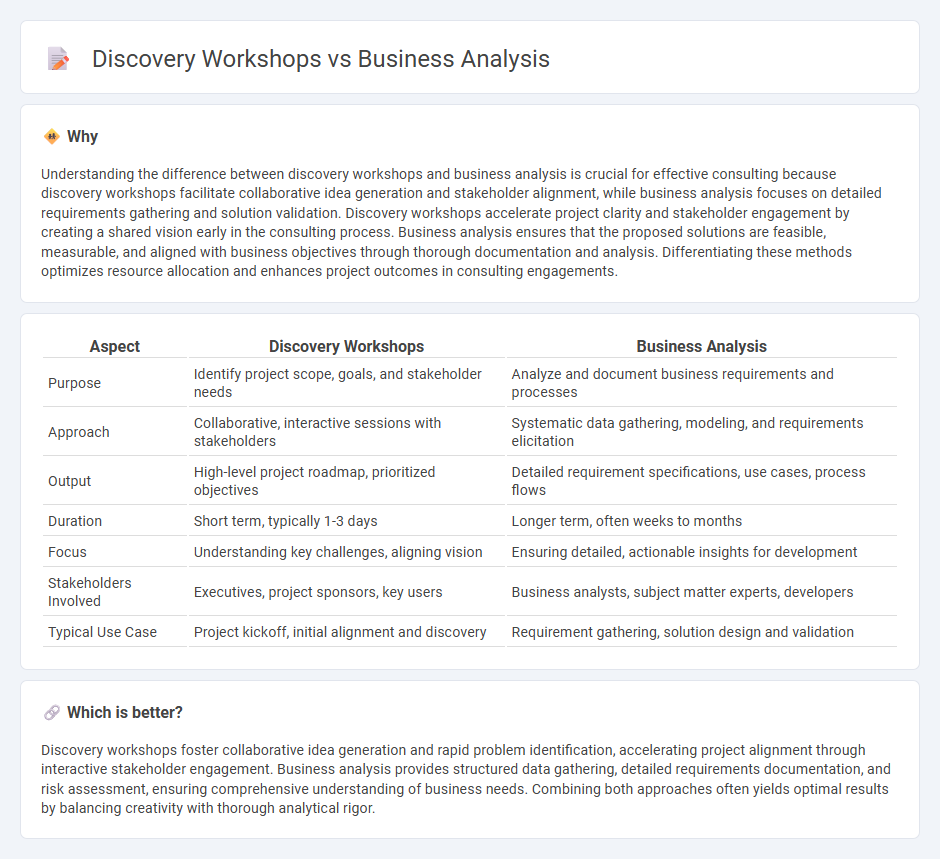
Discovery workshops facilitate collaborative sessions to identify project goals, stakeholder needs, and potential challenges, promoting alignment and innovative solutions early in the consulting process. Business analysis involves a detailed examination of business processes, requirements gathering, and data assessment to create actionable insights and ensure project objectives align with organizational strategy. Explore how both approaches can drive successful project outcomes and enhance strategic decision-making.
Why it is important
Understanding the difference between discovery workshops and business analysis is crucial for effective consulting because discovery workshops facilitate collaborative idea generation and stakeholder alignment, while business analysis focuses on detailed requirements gathering and solution validation. Discovery workshops accelerate project clarity and stakeholder engagement by creating a shared vision early in the consulting process. Business analysis ensures that the proposed solutions are feasible, measurable, and aligned with business objectives through thorough documentation and analysis. Differentiating these methods optimizes resource allocation and enhances project outcomes in consulting engagements.
Comparison Table
| Aspect | Discovery Workshops | Business Analysis |
|---|---|---|
| Purpose | Identify project scope, goals, and stakeholder needs | Analyze and document business requirements and processes |
| Approach | Collaborative, interactive sessions with stakeholders | Systematic data gathering, modeling, and requirements elicitation |
| Output | High-level project roadmap, prioritized objectives | Detailed requirement specifications, use cases, process flows |
| Duration | Short term, typically 1-3 days | Longer term, often weeks to months |
| Focus | Understanding key challenges, aligning vision | Ensuring detailed, actionable insights for development |
| Stakeholders Involved | Executives, project sponsors, key users | Business analysts, subject matter experts, developers |
| Typical Use Case | Project kickoff, initial alignment and discovery | Requirement gathering, solution design and validation |
Which is better?
Discovery workshops foster collaborative idea generation and rapid problem identification, accelerating project alignment through interactive stakeholder engagement. Business analysis provides structured data gathering, detailed requirements documentation, and risk assessment, ensuring comprehensive understanding of business needs. Combining both approaches often yields optimal results by balancing creativity with thorough analytical rigor.
Connection
Discovery workshops facilitate collaborative sessions where stakeholders identify business needs and challenges, providing critical input for comprehensive business analysis. Business analysis uses insights from these workshops to define requirements, evaluate processes, and recommend solutions that align with strategic goals. This connection ensures a thorough understanding of business context, enabling tailored and effective consulting outcomes.
Key Terms
Requirements Gathering
Business analysis workshops emphasize detailed requirements gathering by engaging stakeholders to identify, analyze, and document business needs and solutions. Discovery workshops focus on exploring project scope, objectives, and high-level ideas to uncover opportunities and potential challenges. Explore how these distinct approaches optimize requirements gathering for successful project outcomes.
Stakeholder Alignment
Business analysis workshops emphasize identifying requirements and defining project scope through detailed stakeholder input, ensuring alignment on objectives and deliverables. Discovery workshops prioritize exploring opportunities, gathering diverse perspectives, and uncovering unmet needs to drive innovation and strategic direction. Explore how focused stakeholder alignment techniques in both workshops can enhance project success and drive informed decision-making.
Process Mapping
Business analysis workshops systematically identify requirements and challenges, fostering clear communication between stakeholders and project teams. Discovery workshops emphasize exploring new ideas and gathering insights, often using process mapping to visualize workflows and uncover inefficiencies. Explore how combining these approaches enhances process optimization and decision-making efficiency.
Source and External Links
What is a Business Analysis and What does ... - Business analysis involves gaining insights from data, identifying business needs, and recommending value-adding solutions, often combining techniques like SWOT and PESTLE to address strategic and operational challenges.
Deciphering Business Analysis: Definitions, Processes, Tools - Business analysis is a disciplined approach to identifying needs and solving problems using tools such as capability analysis, business cases, decision modeling, financial analysis, and risk management.
What Is a Business Analyst? 2025 Career Guide - Business analysts gather and analyze data to recommend and design actionable solutions that help organizations achieve goals, optimize efficiency, and increase value for stakeholders.
 dowidth.com
dowidth.com